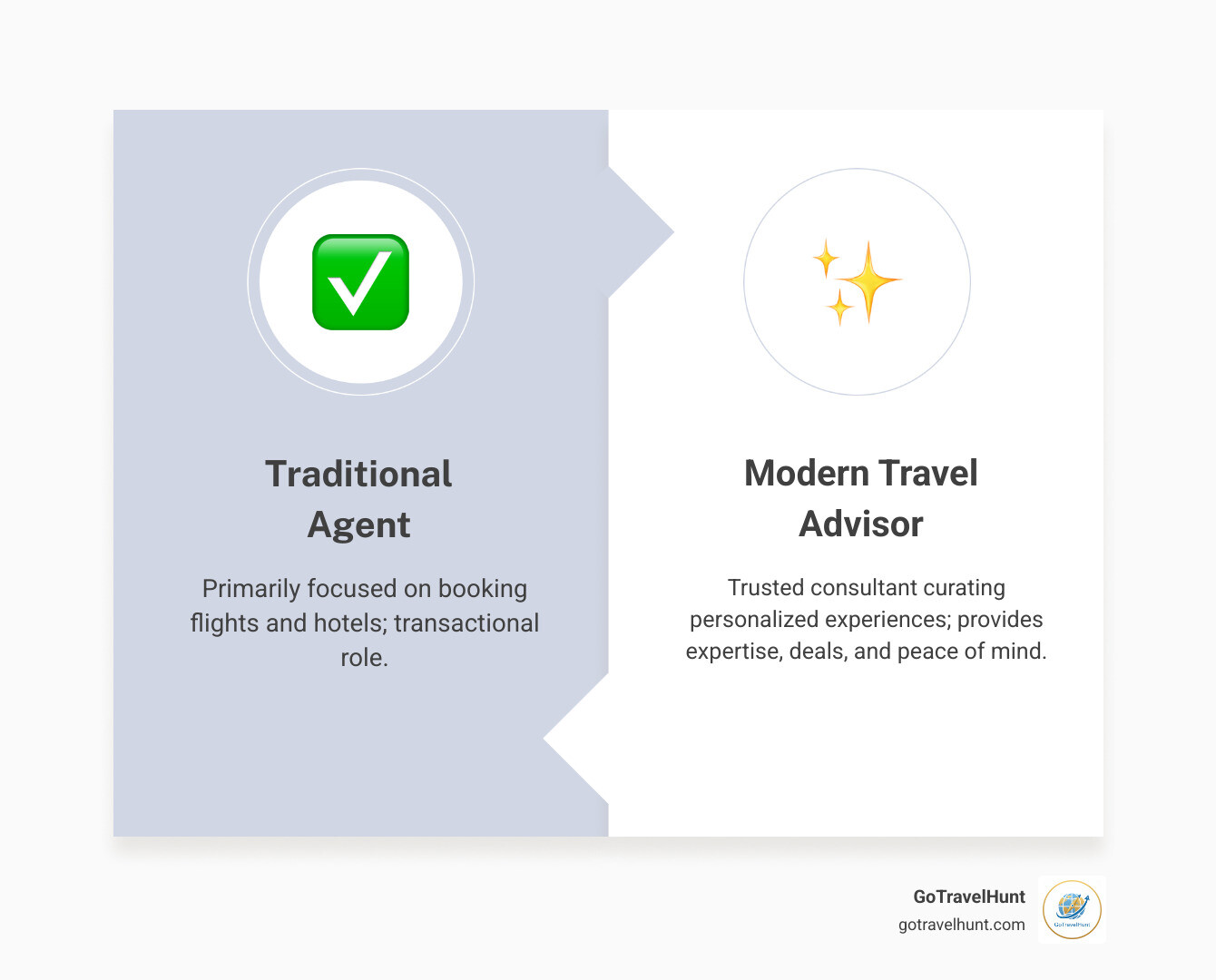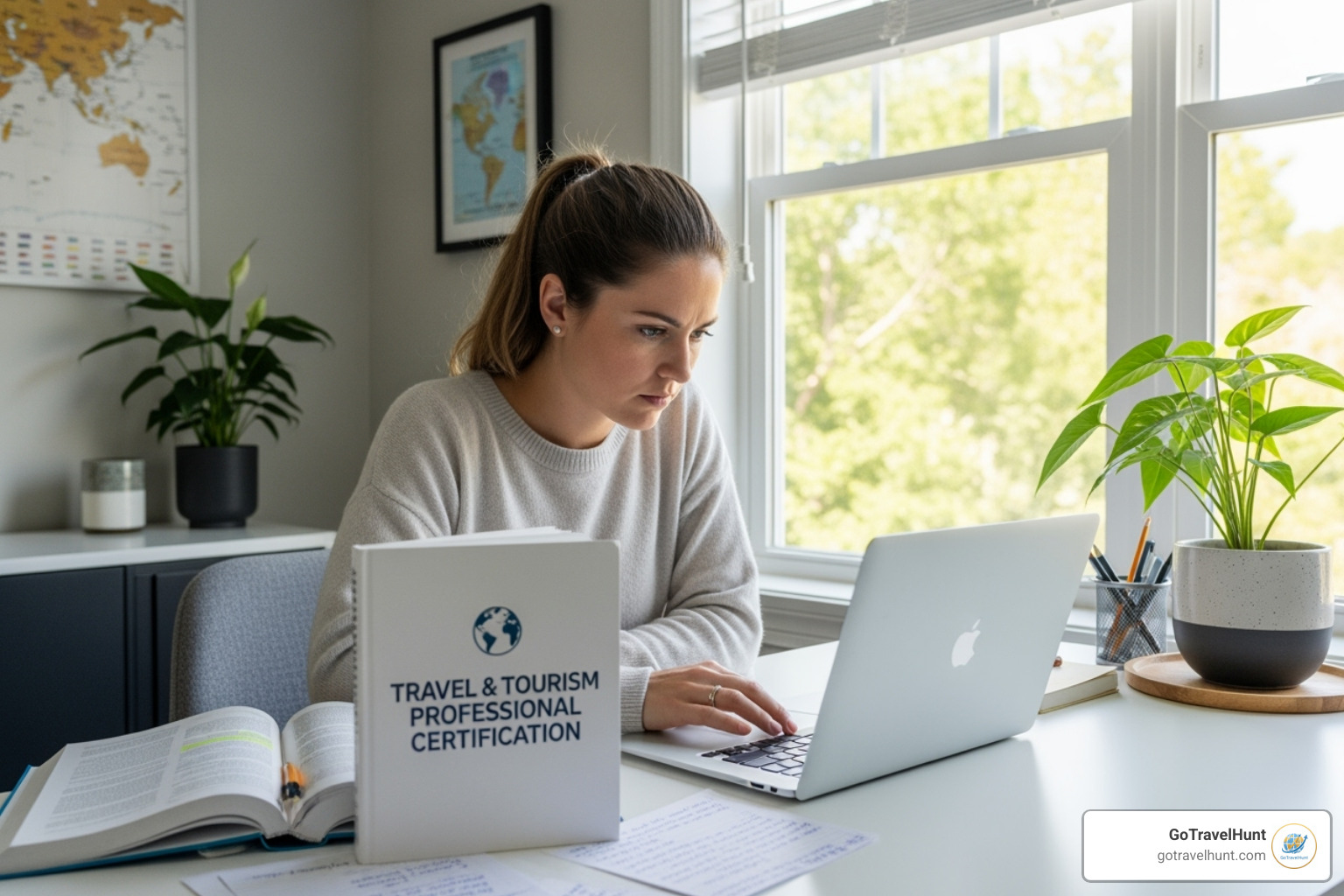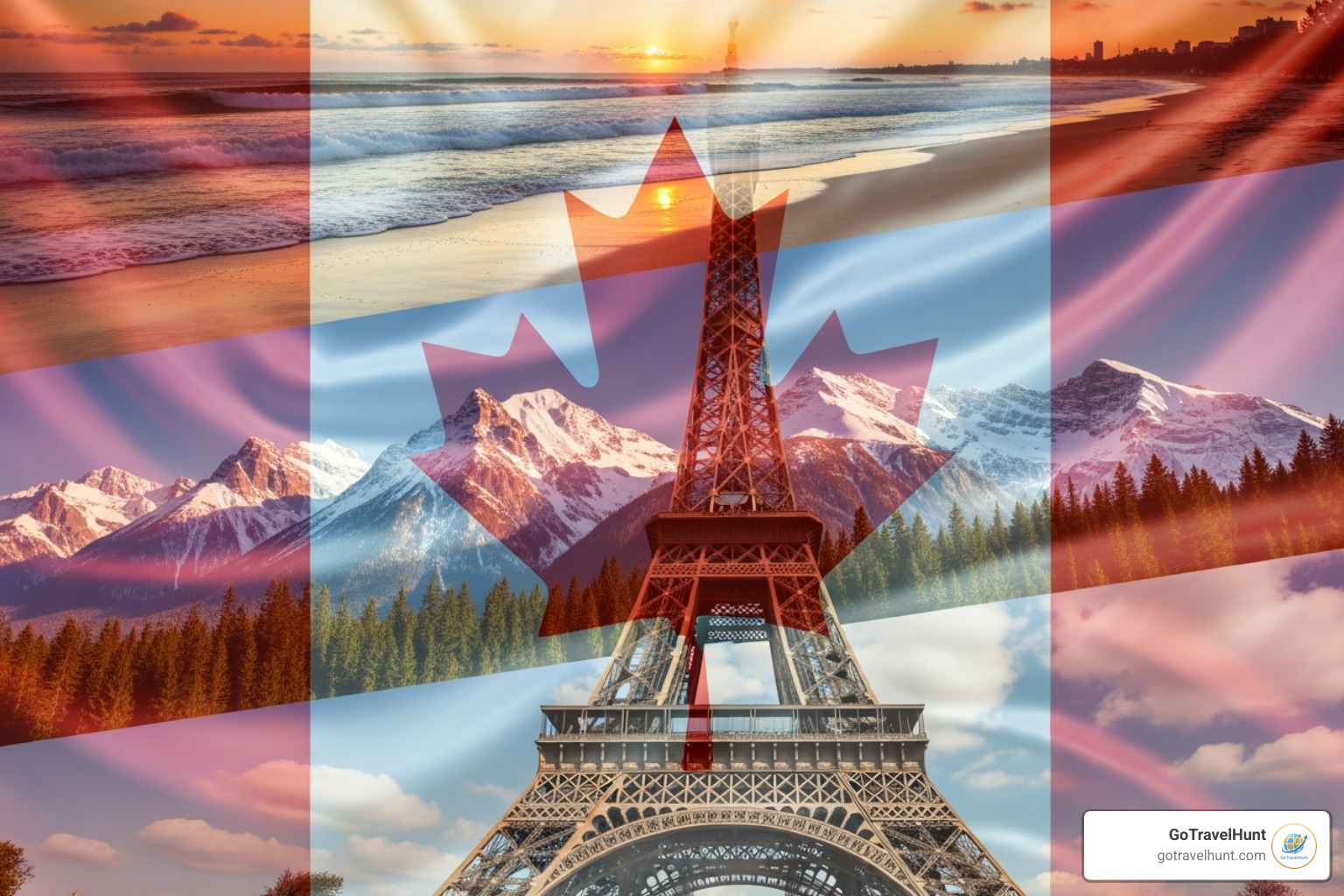Why Becoming a Travel Agent is a Rewarding Career Path
Becoming a travel agent offers a fulfilling career that combines a passion for travel with helping others create memorable experiences. Whether you’re seeking a career change or a flexible work-from-home opportunity, the path to becoming a travel advisor is more accessible than you might think.
Quick Answer: What You Need to Become a Travel Agent
- Education: No degree required; a high school diploma is sufficient.
- Career Path: Choose between working for an agency or as an independent contractor.
- Training: Complete industry certifications like the TAP Test, CTA, or CTC.
- Credentials: Obtain an IATA/TIDS number, often through a host agency.
- Provincial Requirements: Pass exams like TICO in Ontario.
- Key Skills: Develop strong customer service, sales, and organizational abilities.
- Income: The average salary in Canada is around $64,000 annually.
- Networking: Join professional associations like ACTA, ASTA, or CLIA.
The modern travel advisor is a trusted consultant who curates personalized travel experiences. In an age of information overload, your expertise helps clients steer complex itineraries, access exclusive deals, and gain peace of mind. This guide will walk you through every step of launching your travel advisor career, from training and certification to building your client base and growing your business.

Becoming a travel agent terminology:
Your Step-by-Step Path to Becoming a Travel Agent
Starting a career as a travel advisor is an exciting journey. The path involves building a strong foundation of knowledge, understanding the different career models, and acquiring the necessary credentials to operate professionally.
Essential skills for becoming a travel agent
To excel as a travel agent, you’ll need more than just a love for travel. Key skills include:
- Exceptional Customer Service: Listening to clients’ needs and addressing their concerns is paramount.
- Clear Communication: Articulating complex travel details clearly, both verbally and in writing, is crucial.
- Sales and Marketing Acumen: You need to understand client needs and effectively promote your services.
- Organizational Skills: Juggling multiple bookings and intricate details requires meticulous organization.
- Problem-Solving: The ability to think on your feet and find solutions for travel disruptions is invaluable.
- Tech Proficiency: Familiarity with Global Distribution Systems (GDS) like Amadeus, Sabre, and Travelport, as well as CRM software, is essential.
- Geography and Cultural Knowledge: Deep knowledge of destinations allows you to provide expert advice and craft custom experiences.
For more detailed planning insights, check out our travel planning guides.
Choosing Your Career Path: Independent vs. Agency
One of the first big decisions is whether to work for an established agency or as an independent contractor. Both paths have their merits, and the best choice depends on your goals.

| Feature | Independent Agent | Agency Employee |
|---|---|---|
| Pros | Autonomy, higher earning potential, niche specialization, direct client relationships, entrepreneurial freedom. | Stability, guaranteed income, access to resources, client stream, training, and brand recognition. |
| Cons | High startup effort, responsibility for building a client base, sole responsibility for all tasks, potential for isolation, and inconsistent income initially. | Less autonomy, lower commission splits, limited specialization, and a traditional office environment. |
The Host Agency Role: If you choose the independent route, a host agency is a great option. They provide crucial support, including:
- Access to IATA/TIDS Numbers: Essential for earning commissions.
- Training and Resources: Many offer their own training programs and booking tools.
- Administrative Support: They often handle invoicing and payment processing.
- Better Commission Splits: Their volume can lead to higher commission rates with suppliers.
Host agencies recognized by ACTA in Canada offer a supportive ecosystem that balances entrepreneurial freedom with practical assistance.
Training Programs and Certifications
While a degree isn’t mandatory, training and certifications boost your credibility.

Here are some key options:
- The Travel Institute: Offers the TRIPKIT Program for beginners and the Travel Agent Proficiency (TAP) Test, an industry-recognized credential. They also provide advanced certifications like Certified Travel Associate (CTA). Learn more at The Travel Institute.
- IATA/IATAN (International Air Transport Association): An IATA Code (TIDS) is a global ID for earning commissions. The IATA/IATAN ID Card is a recognized industry credential. Visit the IATAN website for more.
- CLIA (Cruise Lines International Association): Offers specialized certifications for those interested in the cruise industry, such as Accredited Cruise Counsellor (ACC).
- GDS Training: Training in Global Distribution Systems (GDS) like Amadeus, Sabre, and Travelport is highly valuable for booking flights, hotels, and car rentals.
- ASTA (American Society of Travel Advisors): Provides training and resources, including their “Roadmap to Becoming a Travel Advisor” course. Explore their offerings at ASTA.
The Business of Travel: Licensing, Income, and Operations in Canada
If you’re planning on becoming a travel agent in Canada, understanding the business side is key. While there’s no federal license, several provinces have their own regulations to protect consumers.

Key steps for becoming a travel agent in Canada
While there’s no national license, you must comply with provincial rules:
- Ontario: Agents must pass the Travel Industry Council of Ontario (TICO) exam. This 50-question multiple-choice test costs $35 and ensures you understand consumer protection laws.
- British Columbia: You’ll need a license from Consumer Protection BC and may have to contribute to the Travel Assurance Fund (TAF).
- Quebec: The Office de la protection du consommateur (OPC) requires specific licensing and compliance.
These regulations are in place to maintain high industry standards. You’ll also need to register your business with the Canada Revenue Agency (CRA) and choose a business structure. You can find more information on choosing a business structure here.
How Travel Agents Earn Income
Travel agents primarily earn money through commissions and service fees.
- Commissions: Suppliers (airlines, hotels, cruise lines) pay you a percentage of the booking value, typically after the client has traveled. For example, a hotel might offer an 8-10% commission.
- Service Fees: Many agents now charge a fee for their planning and research services. This can be a flat rate, an hourly charge, or a retainer, ensuring you’re compensated for your expertise regardless of commission levels.
Additionally, agents often receive travel perks like discounted rates and familiarization (FAM) trips, which help you gain knowledge of destinations. The average salary for a travel agent in Canada is around $64,000, but this can vary based on experience, location, and business model. Whether you’re booking budget travel or luxury getaways, your earning potential grows with your client base and sales skills.
Starting Your Own Travel Agency
Launching your own agency offers great autonomy but comes with more responsibility.
- Choose a Business Structure: Most independent agents start as a sole proprietor, which is simple to set up. Other options include a partnership or a corporation, which offers more liability protection but requires more administrative work. Learn more about these options here.
- Register Your Business: You must register with the Canada Revenue Agency (CRA) for tax purposes, which includes getting a business number and setting up GST/HST accounts if applicable.
- Get an IATA/TIDS Number: This industry identifier is crucial for earning commissions. The easiest way to get one is by affiliating with a host agency.
- Secure Insurance: Protect your business with Errors & Omissions (E&O) insurance for professional liability and General Liability insurance. Some provinces also require travel consumer protection insurance.
Starting your own agency means you control everything from your business travel booking software to your marketing, offering a rewarding path for the entrepreneurial-minded.
Growing Your Travel Business and Expertise
Once you’re set up, the focus shifts to growing your business and expertise. The travel industry is always changing, so continuous learning and strategic client engagement are key to a sustainable career.

Building Your Brand and Choosing a Niche
To stand out, you need a strong brand and a clear niche. Your brand is your promise to clients, reflecting your unique approach and expertise.
Choosing a niche allows you to become a go-to expert, attract a loyal clientele, and command higher fees. Popular niches include:
- Luxury Travel: Curating high-end, bespoke experiences. For inspiration, explore our luxury travel category.
- Adventure Travel: Planning trips for thrill-seekers, like safaris or trekking.
- Solo Travel: Guiding individuals on empowering journeys. Check out our solo travel destinations for ideas.
- Couples and Honeymoon Travel: Crafting romantic getaways.
- Family Travel: Planning trips that cater to all ages.
- Corporate Travel: Managing business trips with a focus on efficiency and cost.
- Destination Specialist: Focusing on a specific region you know well, like Europe.
Strategies for Growing Your Client Base
Building a client base requires consistent effort and exceptional service.
- Networking: Start with your personal network of friends and family, and attend local business events.
- Referrals: Encourage word-of-mouth by offering a referral program to happy clients.
- Social Media Marketing: Use platforms like Instagram and Facebook to showcase destinations, share tips, and engage with potential clients.
- Industry Events: Attend trade shows to connect with suppliers, learn about new products, and network with other agents.
- Professional Associations: Join organizations like ACTA or ASTA for networking, resources, and credibility.
- Local Partnerships: Collaborate with complementary businesses like wedding planners or event coordinators for a steady stream of referrals.
Staying Current with Industry Trends and Technology
The travel industry is dynamic, so staying informed is crucial for success.
- Read Industry News: Follow publications like Skift and Travel Weekly to stay updated on trends, destinations, and regulations.
- Attend Webinars and Conferences: These are great for professional development and learning about new products.
- Accept Technology:
- Global Distribution Systems (GDS): Master tools like Amadeus, Sabre, and Travelport for efficient booking.
- Customer Relationship Management (CRM): Use CRM software to manage client information and personalize service.
- Online Booking Tools: Stay proficient with various travel booking tools to find the best options for your clients.
- AI and Automation: Keep an eye on new technologies that can streamline your workflow, allowing you to focus on providing expert, personalized advice.
By staying current, you ensure you’re always offering the most valuable service to your clients.
Frequently Asked Questions about Becoming a Travel Agent
Here are answers to some common questions about becoming a travel agent.
Do I need a degree to become a travel agent?
No, a formal degree is not required. A high school diploma is typically the minimum. What’s more important is your passion for travel, strong communication skills, and a commitment to learning. Industry certifications like the Travel Agent Proficiency (TAP) Test or Certified Travel Associate (CTA) are highly recommended to build credibility and demonstrate your expertise. Practical experience, whether from personal travel or an entry-level role, is also invaluable.
How much does it cost to start as a travel agent in Canada?
The initial investment varies depending on your path. Here’s a general breakdown:
- Training & Certification: Expect to spend between $300 and $2,000 on courses and exam fees (e.g., the TICO exam in Ontario is $35).
- Host Agency Fees: If you join a host agency, startup fees can range from $100 to $500, with possible ongoing monthly fees.
- Independent Agency Setup: If you start your own agency, costs for business registration, insurance, and marketing can exceed $2,000.
- Technology: Budget for a reliable computer, internet, and any necessary software.
What are the daily responsibilities of a travel agent?
A travel agent’s day is a mix of client service, research, and administration. Key tasks include:
- Consulting with clients to understand their travel needs and preferences.
- Researching destinations, accommodations, and activities.
- Creating and presenting personalized itineraries.
- Booking flights, hotels, tours, and other travel components.
- Managing payments and organizing travel documents.
- Providing support to clients before and during their trips.
- Marketing your services and managing business operations.
- Staying updated on industry trends and new travel products.
Conclusion
Becoming a travel agent is a rewarding career that transforms a passion for travel into a profession of creating unforgettable experiences. The modern travel advisor is a valued expert who steers the complexities of travel planning, from securing exclusive deals to providing peace of mind.
This guide has outlined the key steps: acquiring essential skills, choosing between an agency or independent path, getting certified, and understanding the business and legal requirements in Canada. Success lies in building a strong brand, finding your niche, and continuously learning to stay ahead of industry trends.
If you’re ready to turn your love for travel into a career, the opportunities are vast. It’s a path that offers flexibility, personal fulfillment, and the chance to help others explore the world.
Ready to take the next step? Whether you’re looking to plan your own next adventure or help clients find theirs, start planning your next adventure with our comprehensive guides. The world is waiting, and as a travel agent, you hold the keys to open uping it.












